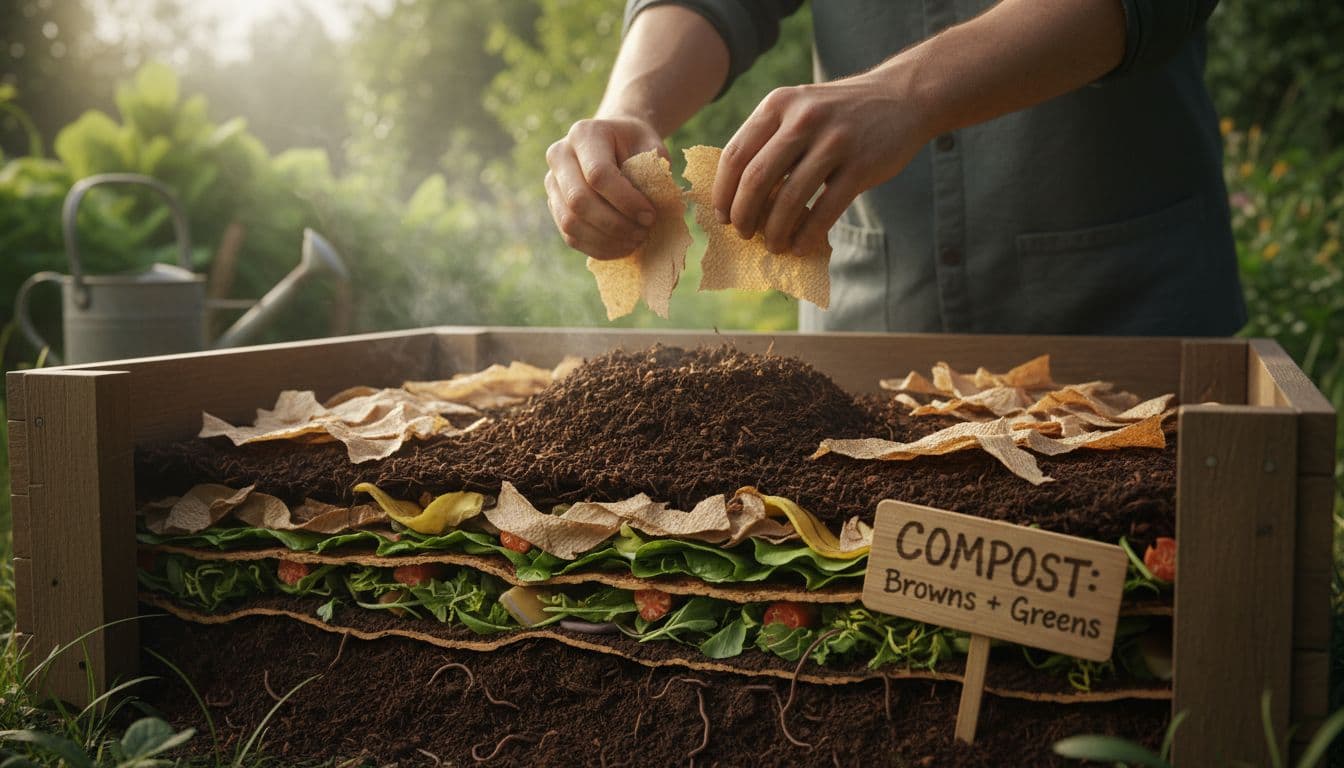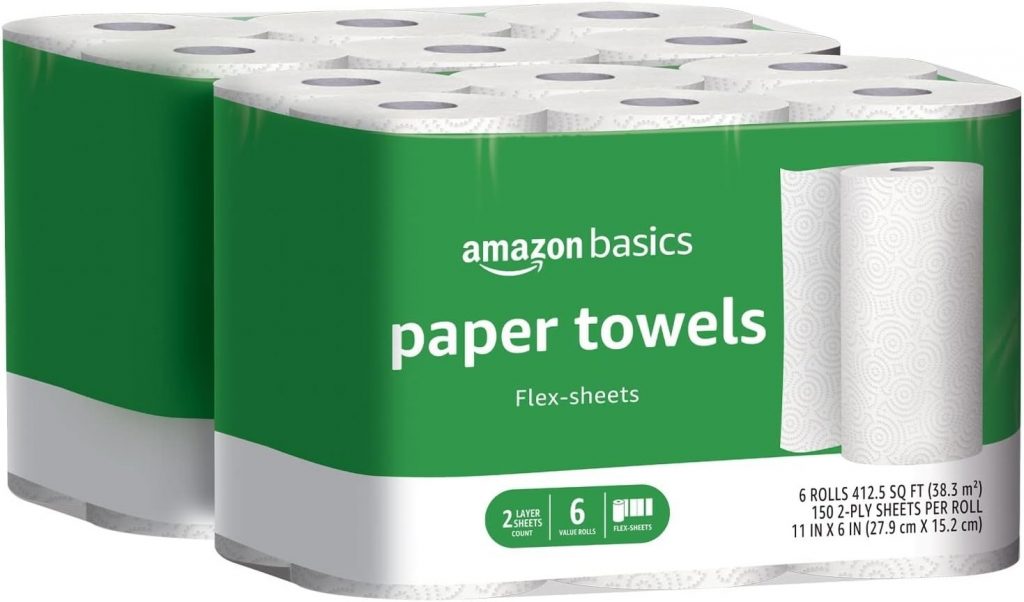Safe Uses and Risks
Can I Put Paper Towels in My Compost?
Learn which ones are safe, which to skip, and how to tear and layer them as carbon for faster, cleaner compost.
Yes, when it comes to composting paper towels, you can put most used paper towels in your compost.
Stick to unbleached paper towels that only touched water, plant-based foods, or simple spills.
Skip anything soaked with cleaning chemicals, grease, cooking oil, or meat juices.
Those can slow decomposition and hurt the helpful microbes in your compost pile.
This type of towel is perfect. Low cost too!. Get yours today!
Composting is simple. You’re turning kitchen scraps and yard waste into rich, crumbly soil that feeds plants.
Think of it as giving leftovers a second life in your garden. It cuts bin waste, saves money on soil, and supports healthier soil life.
If you’re just starting out, keep things easy. Tear clean paper towels into smaller pieces, then mix them with food scraps and dry browns like leaves or cardboard.
Balance is the goal, not perfection, and we’ll walk you through beginner-friendly tips that really work.
At Compost Charm, we focus on clear, friendly advice for new composters. We cover compost bins, worm bins, and tumblers, plus quick troubleshooting when smells or fruit flies pop up.
For a deeper look at what belongs in your pile, our guide to unexpected waste for composting can help you judge tricky items like dyed or scented paper towels.
By the end, you’ll know when paper towels are safe, how to add them the right way, and what to avoid.
You’ll also learn how composting supports sustainable living at home. Ready to keep more waste out of the bin and grow better soil?
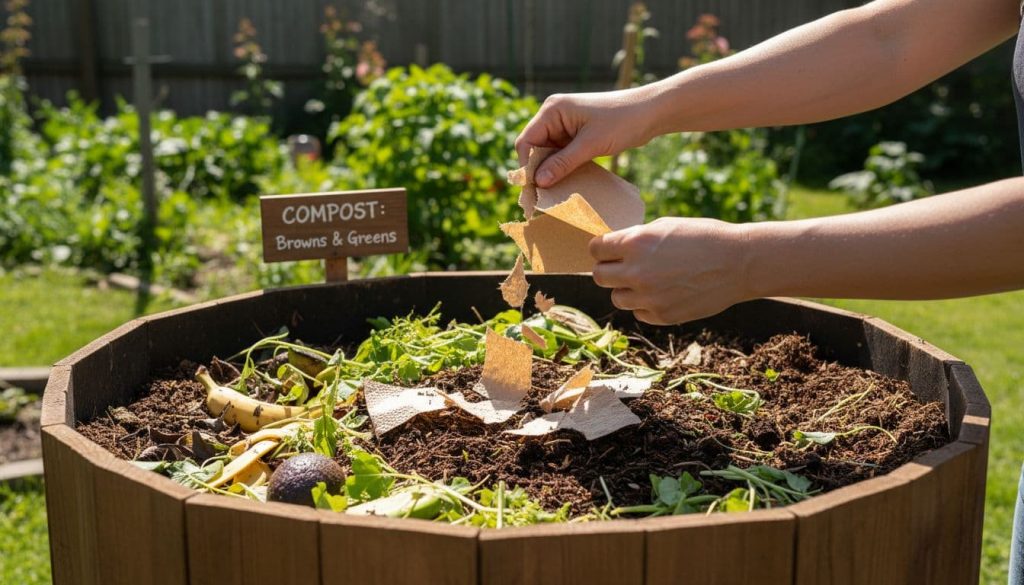
Let’s get started.
What Types of Paper Towels Are Safe for Composting?
Short answer to “Can I put paper towels in my compost?”
Yes, if they are plain and not contaminated. Look for unbleached paper towels or recycled paper towels that only touched water, produce, or simple spills.
These count as “browns,” which add carbon and help your pile stay light and fluffy.
In a compost tumbler, they improve airflow; in a worm bin, they make soft bedding and feed.
If you are new to composting, a quick rule helps: clean, dye-free paper towels go in, anything greasy or chemical-heavy stays out.
Compostable paper towels are those without additives, making them ideal for your home compost pile.
If you want a simple walk-through of getting started, our guide on Starting Composting at Home covers the basics and shows how to balance materials.
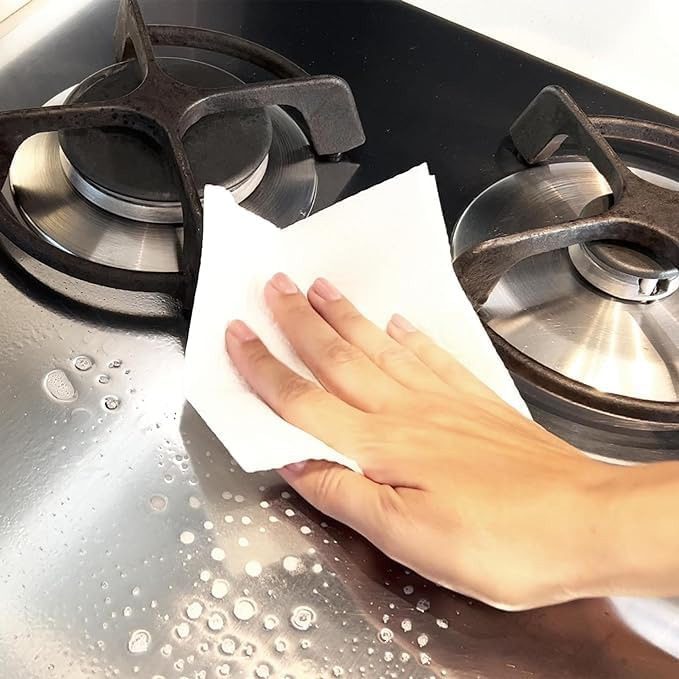
Signs Your Paper Towels Are Compost-Ready
You do not need fancy tests. Use these quick checks before you add them to your pile or worm bin.
- No bright dyes or printed inks. Choose plain, unpatterned towels. Avoid glossy coatings that feel slick.
- No strong scents or lotions. Fragrances and softeners can bother microbes and worms.
- No chemical smell. If it smells like bleach, cleaner, or disinfectant, keep it out.
- No grease or oil. Fatty residues slow breakdown and can cause smells.
- Only paper. Skip anything with plastic netting, glitter, or scrubbing fibers.
- Prefer unbleached or recycled options. These are often gentler on your compost system and qualify as compostable paper towels.
Make them easier to digest by shredding them into strips or small squares. Lightly moisten them so they do not clump.
Mix with “greens” for balance:
- Good partners: fruit peels, veg trimmings, coffee grounds, fresh grass.
- Aim for a mix that feels like a wrung-out sponge, not soggy or dusty.
Using a compost tumbler? Add small amounts of shredded paper towels in layers to prevent clumps.
Using vermicomposting? Worms love plain, damp paper towels as bedding and food.
Add a handful at a time, tear into small pieces, and avoid towels soaked with soap or spicy sauces.
If you want a broader view of how different compost systems handle paper products, explore 6 Effective Composting Methods.
For more on why “100 percent paper” matters, this guide on composting paper products without coatings explains why wax, plastic, or BPA-lined paper does not belong in your bin.
What to Avoid and Why It Matters
Dirty paper towels do more harm than good. They can upset the balance, slow decomposition, or invite pests.
Keep these out for a cleaner, faster composting process, especially to avoid introducing contaminants like pathogens from meat or dairy.
- Meat juices or dairy: These attract animals and can introduce unwanted bacteria.
- Cooking oil and grease from fatty foods: They coat materials, block airflow, and cause sour smells.
- Bleach, disinfectants, or cleaning products: These chemicals can kill the very microbes that power compost and may introduce risks from germs. Worms can also be harmed in a worm bin.
- Paint, solvents, or motor oil: These do not break down safely in home compost.
- Scented or lotion-infused towels: Additives can linger and affect your compost biology.
- Glitter or synthetic fibers: Plastics stay in your soil, which nobody wants.
If you are unsure about a towel’s past, leave it out. Compost does best with simple, plant-based inputs.
For a clear overview of what makes a paper towel compostable and why bamboo paper towels or recycled options can be kinder, see this friendly guide on composting paper towels and what to know.
A greener habit is to use washable cloths for heavy messes, then save paper towels for light, clean tasks.
If you want easy habit swaps that shrink bin waste, our Don’t Toss It Campaign shares practical ideas you can start today.
Key takeaways:
- Plain, undyed, unscented paper towels that touched water or plant-based food are safe.
- Shred and mix with “greens” for faster breakdown. Keep the pile lightly moist.
- Avoid towels with grease, meat juices, or chemicals; they cause smells and slow decay.
- Worm bins and tumblers both benefit from small amounts of clean, shredded paper towels.
</EXISTING_CONTENT>
How to Add Paper Towels to Your Compost Pile Step by Step
Yes is the short answer to Can I put paper towels in my compost? Plain, undyed towels that only touched water or plant-based food are great carbon.
Here is a simple way to add them so they break down fast and keep your bin healthy.
- Shredding towels into strips for better airflow.
- Moisten until they feel like a wrung-out sponge.
- Layer paper towels with food scraps, leaves, or cardboard.
- Mix the pile to spread moisture and prevent mats.
- Check the smell and texture each week, then adjust.
If you want a quick refresher on the basics, these practical tips for composting paper towels faster cover shredding, moisture, and turning frequency.
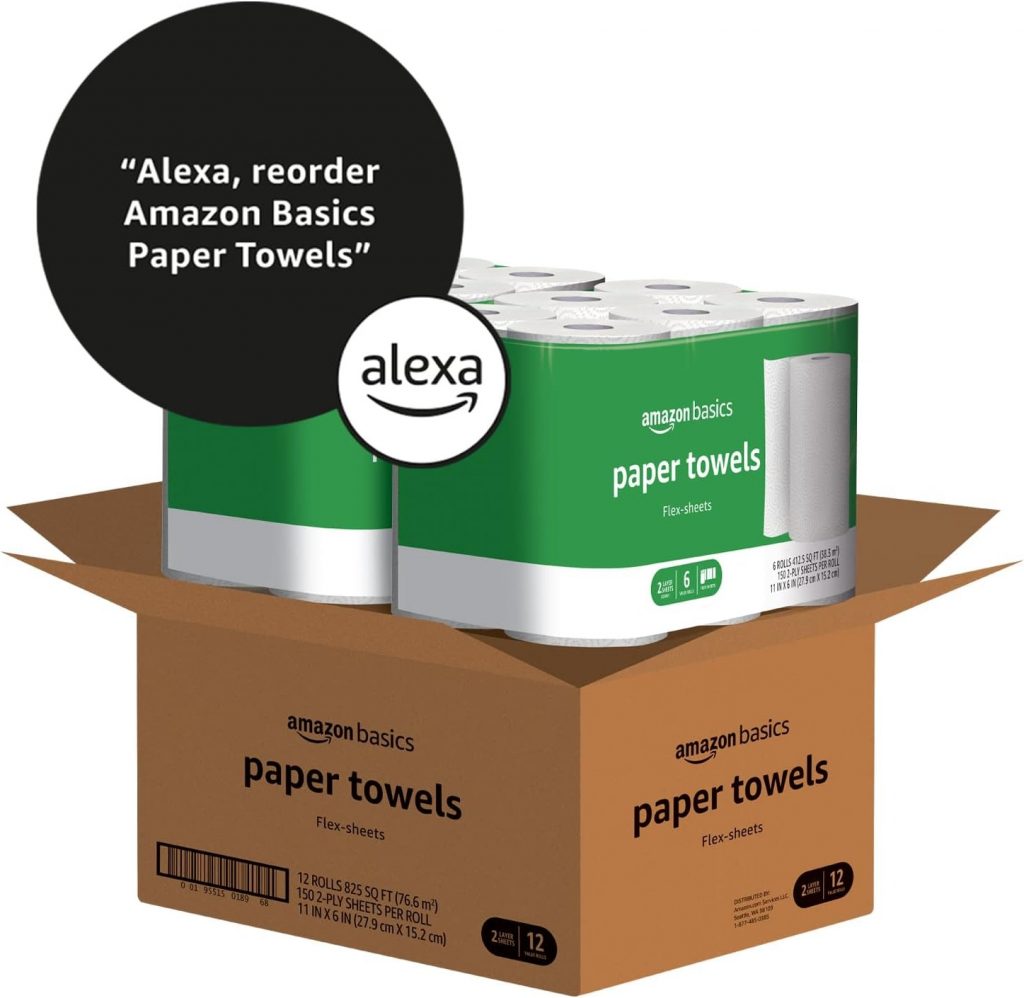
Balancing Your Compost with Paper Towels
Paper towels are brown materials, so they add carbon. Aim for 2 to 3 parts browns to 1 part greens by volume.
For every bowl of veg scraps or coffee grounds, add two to three handfuls of torn paper towels and dry leaves.
This mix feeds microbes and keeps the pile fluffy.
Common signs help you correct the balance fast:
- Smelly or slimy pile: too many greens or too wet. Add more shredded paper towels, dry leaves, or cardboard. Turn the pile to bring in air.
- Slow decomposition or dusty, pale material: too many browns or too dry. Add a watering can’s worth of moisture and a small bucket of greens. Mix well.
- Clumping paper: towels were added in whole sheets. Tear smaller and blend through the pile.
Season matters. In summer, heat speeds decay, so you may need more browns to prevent a soggy mess.
In winter, materials break down slowly, so go lighter on browns and add a little extra greens and moisture.
For an easy, month-by-month plan, check our friendly Composting Calendar Tips.
Quick ratio checks that work:
- The pile should look speckled with both greens and browns.
- Squeeze test: a handful should drip one or two drops at most.
- Temperature feels warm in the center, not cold or scorching.
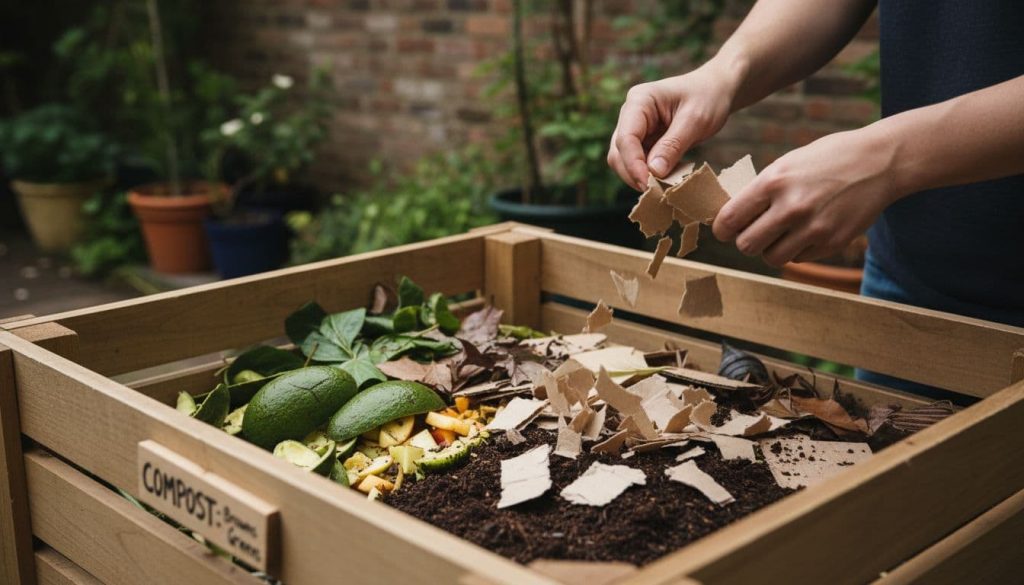
Troubleshooting Common Issues
Most hiccups are simple fixes.
Start with small changes, then watch for improvement over a week.
- Pests like flies or rodents: bury food scraps and towels 15 to 20 cm deep. Stop adding cooked food or anything greasy. Add extra browns and cover fresh additions.
- Slow composting: turn more often, at least once a week. Add a mix of greens and a splash of water. Shred towels into smaller pieces to avoid mats.
- Over-adding paper towels: keep them to part of your browns, not the entire brown layer. Pair with leaves or shredded cardboard to balance texture.
- Bad smells: mix in more carbon, then fluff the pile for air. This usually clears within days.
New to composting? Do not stress. Compost is forgiving. If you want quick, tailored guidance, ask our bot anything through the Ask A Question page.
Share what your pile looks like, what you added, and your weather. You will get simple steps to fix it.
Key takeaways:
- Paper towels count as browns. Keep a 2 to 3 parts browns to 1 part greens ratio.
- Smells mean too wet. Add dry towels and turn the pile.
- Slow decay means too dry. Add greens and water, then mix.
- Adjust with the seasons, and do not add towels that touched chemicals or heavy grease.
The Benefits of Composting Paper Towels and Eco-Friendly Tips
Can I put paper towels in my compost? Yes, if they are plain, undyed, and only touched water or plant-based food.
These compostable items add useful carbon when composting, keep bins tidier, and support healthy soil.
It also shrinks what you send to the landfill, where it would otherwise decompose into methane, a harmful greenhouse gas, helping reduce the environmental impact for your home and the planet.
Eco Wins for Your Home and Planet
Composting clean paper towels is a small habit with big ripple effects. Food scraps and paper products make up a large share of household waste.
When you compost them, you turn would-be trash headed to the landfill into soil food that helps plants grow stronger.
- Less paper towel waste: safe ones become free carbon in your pile.
- Improves soil health: shredded ones help create fluffy structure, so microbes and air can do their work.
- Lower smells: balanced compost stays airy and fresh, which keeps pests away.
- Simple habit: switch to paper towel alternatives like washable cloths, and use a countertop caddy for peels to make daily additions easy.
Live in a flat or tight space?
Vermicomposting is perfect for apartments. Worms happily eat damp, non-greasy pieces and turn them into rich castings. A small indoor bin fits under the sink or on a balcony and works year-round.
Start with a handful each week, keep bedding moist like a wrung-out sponge, and avoid any that touched cleaners or oils.
 Photo by Greta Hoffman
Photo by Greta Hoffman
Key takeaways:
- Clean, plain ones make safe carbon and reduce waste.
- Shred, moisten lightly, and mix with food scraps for faster breakdown.
- Vermicomposting in small homes or apartments handles them well.
- Skip ones with grease, oil, or chemicals to protect compost biology.
Conclusion
Can I put paper towels in my compost? Yes, clean paper towels are compostable when they are plain, undyed, and free from grease or chemicals.
Shred them, moisten lightly, and mix with food scraps and dry browns to keep the compost pile airy and active—this boosts the texture of the compost pile while preventing methane from building up in landfills.
This simple composting habit cuts bin waste and supports a healthy, fast-working pile.
Try it this week, then explore simple methods that fit your setup with these low-effort compost systems for paper towels. If paper towels aren’t suitable for composting, recycling is a great alternative for reducing waste.
Thanks for reading. Share how it goes and keep the momentum going at home and in the garden.
Key takeaways:
- Safe types: plain, undyed, unscented paper towels without grease or chemicals.
- Preparation: tear into small pieces, dampen, and bury with greens and browns.
- Balancing: aim for 2 to 3 parts browns to 1 part greens.
- Monitoring: fix smells with more dry browns, speed up slow piles with moisture and mixing to help materials decompose faster.
FAQ:
- What if my paper towels have a little grease from fatty foods?
- Skip them. Grease from fatty foods slows decay and can cause smells.
- Can I compost bleached paper towels?
- If they only touched water or produce and have no strong chemical smell, they are usually fine.
- Are printed or scented towels okay?
- Avoid them. Inks, fragrances, and lotions can upset microbes and worms.
- Can I add paper towels to a worm bin?
- Yes, if they are plain and damp. Add small amounts and avoid anything that has been touched by cleaners.
- How much should I add at once?
- Start with a handful or two, then adjust based on smell, moisture, and breakdown speed.

